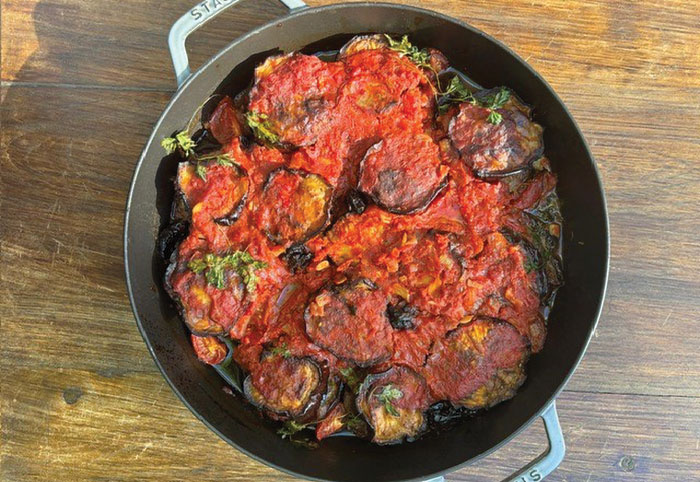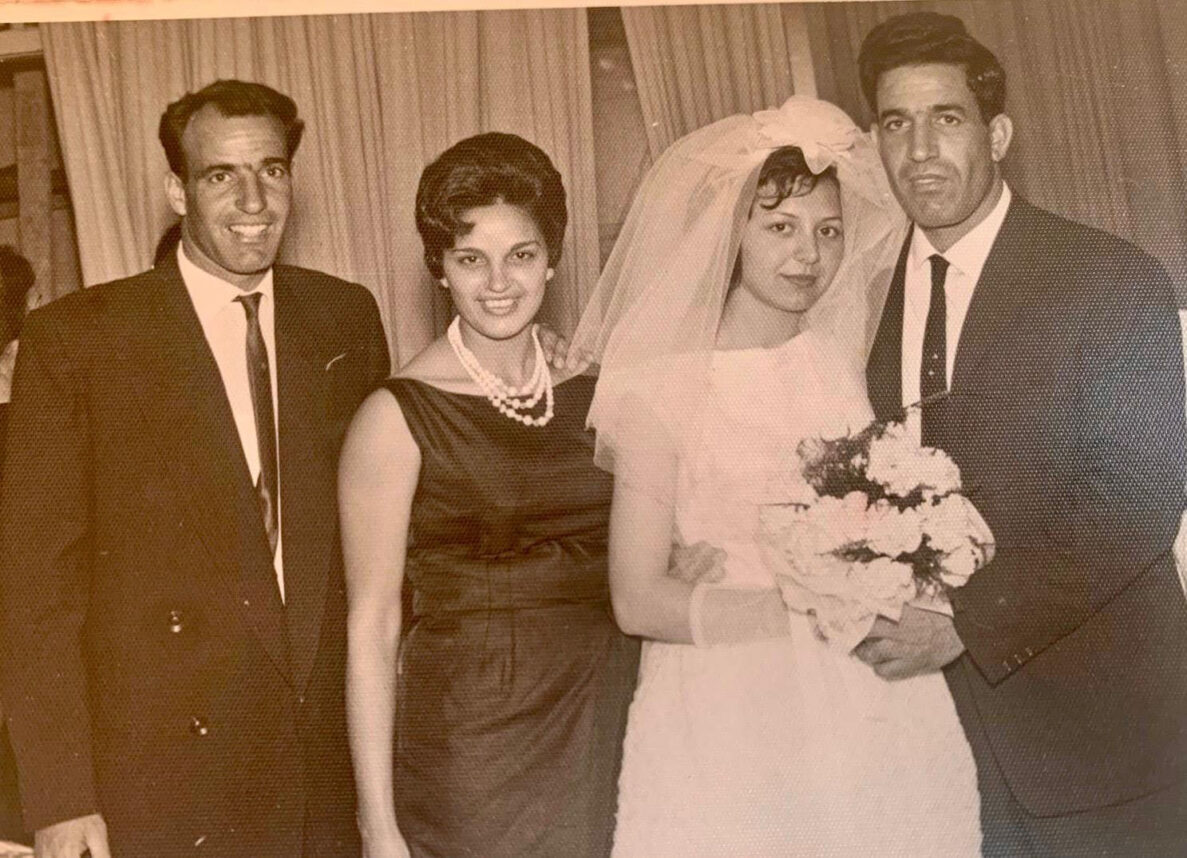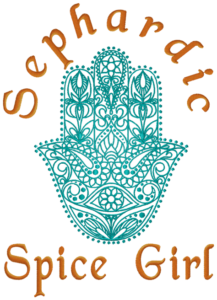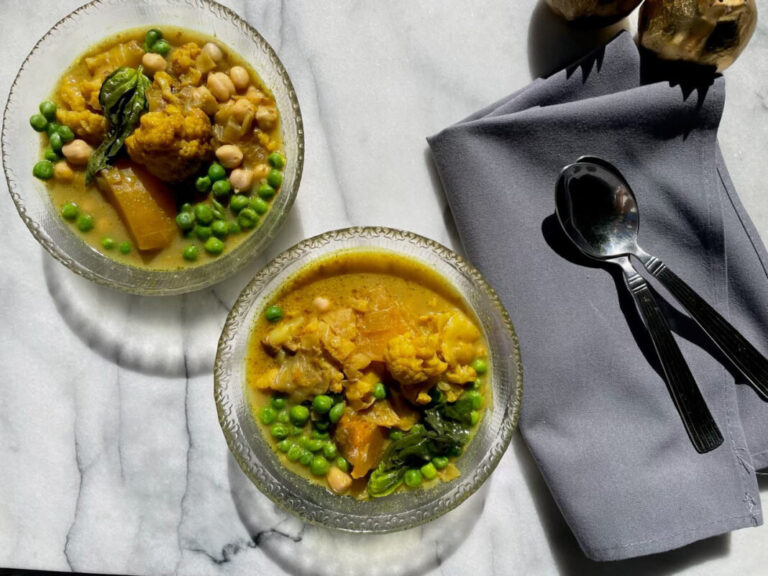Ingriye – A Favorite Iraqi Eggplant Casserole

In the early 1970s, the pale blue aerogrammes would arrive every month. The thin, almost translucent paper was folded origami style, into an envelope, with the front addressed to my mother in English. But after my mother would carefully open the aerogramme, the contents revealed a missive written in a tight Hebrew script.
I remember my mother’s happiness, reading these letters from Israel, a world away from our home in Kirrawee, a remote town in the southern suburbs of Sydney.
My mother was corresponding with my aunt Shoshana, who was married to my father’s brother Shlomo.
When my parents married, my mother and Shoshana became best friends. Their lives in Israel seemed parallel. My father and Shlomo had built a duplex villa in Ramat Gan, each family living side by side. Their son Rafi was eleven months older than my brother Rafi. They were both named in memory of my paternal grandfather, who passed away too young. Their daughter Ronit was five months older than me.
My mother loved to tell me about the time that she and Shoshana were pushing Ronit and me in our strollers in Beer Sheva. An American couple came up to my mother and asked if they could buy me. Thankfully, my mother declined the transaction. Shoshana playfully offered my cousin Ronit. No, they wanted the other baby.
When my maternal grandparents left Israel with all seven of my mother’s siblings, my parents followed, and their paths diverged.
When we returned to Israel in September 1973, we stayed with Shlomo and Shoshana, who now had another son, three-year-old Ayal. Every morning, Shoshana would have four tall glasses of hot chocolate and cheese toast waiting on the kitchen counter for us older children.
On the second Friday of our visit, I had a tantrum. I was very upset that we weren’t celebrating Friday night. “How can it be that we have Shabbat in Australia and not in Israel?” I asked. My mother and Shoshana laughed. Shoshana responded “Ah’t tzo’deket! — You are right!” From then on, every Friday night, my uncle Shlomo made Kiddush and we enjoyed dinner together.
When the Yom Kippur war broke out, it was Shoshana who reassured me that Israel would win. She stocked the mik’lat (underground bomb shelter) with Marie biscuits, Bissli and other snacks.
Four years later, we went back to Israel for my brother Rafi’s bar mitzvah. Shoshana framed our visit by referencing Anwar Sadat’s historic visit to Israel. “Last time you were here for the war. This time you are here for Shalom, peace!”
In 1980, my brother Rafi and I travelled to Israel for our summer holiday. Of course, in the Northern Hemisphere, it was winter, and my cousins were in school. I ended up spending a lot of time with Shoshana. She was probably one of the loveliest, kindest people you could meet. She was tall and slender, with long straight black hair, large almond eyes, a small, upturned nose and a dark skin tone. Her voice was gravelly from years of smoking. To me, it seemed that she had a perennial smile.
When i asked her why she had a torn earlobe, she told that as a young girl, she and her mother were walking in Baghdad. An Arab ran up to her and violently snatched the gold earring from her ear, leaving her bleeding on the street.
Some days, I would visit Shoshana at her work at the Shekem on Bialik Street, the main artery of Ramat Gan. The Shekem is a company that supplies goods for IDF soldiers in the canteens on military bases. But in those days, the Shekem company also ran family stores, where you could find reasonably priced clothing, shoes and everything else. Every city in Israel had a Shekem.

My grandmother Savta Rosa, who was widowed a decade after making Aliyah to Israel, worked hard to make sure that all her nine children married Iraqi Jews (my youngest uncle Aryeh married a Syrian girl). My mother and Shoshana laughed about the fact that she had set up both their marriages. But the matchmaking seemed successful. Both my father and my uncle Shlomo were completely besotted with their wives.
Both my father and my uncle Shlomo were completely besotted with their wives.
I spent a lot of time in the kitchen with Shoshana. Often, we would fry schnitzel and potatoes, or bake chicken, boil rice and chop Israeli salad. But one memory stands out — when she made a special meat and eggplant casserole. This is Shlomo’s favorite dish, she told me, as she went about salting and roasting the eggplant, mixing the spices with the ground beef and preparing the tomato sauce. As a young girl, I was so impressed by this loving gesture.
Some years later, Shoshana and Shlomo and their two younger children Ayal and Ifat, joined us for a three-month visit in Los Angeles, the only time she ever left Israel.
Years went by, all her children married, and she became a grandmother. But then in 2003, she was diagnosed with Stage IV lung cancer. My parents traveled to Israel to say their goodbyes.
Just before our first daughter was born, Shoshana passed away at the age of 62. We named our daughter Gabriella Rose, in honor of Alan‘s grandmother and my grandmother Rosa. But a little part of my heart felt that it was also in honor of Shoshana, which means rose in Hebrew.
—Sharon
Ingriye–Roasted Eggplant & Ground Beef Casserole
TOMATO SAUCE:
4 Tbsp extra virgin olive oil
2 onions, thinly sliced
2 garlic cloves, grated or finely chopped
1 14-oz can of chopped tomatoes
1 tsp salt
1/2 tsp pepper
1/2 cup water
Juice of large lemon
Warm olive oil in a skillet over medium heat. Add the onion and sauté until tender.
Add the garlic, chopped tomatoes, salt and pepper.
Lower heat and allow to simmer for 10 minutes.
Add the water and lemon juice and stir well. Simmer for 2 more minutes. Set aside.
EGGPLANT AND BEEF:
3 medium eggplants, sliced into 1/4 inch rounds
3 tsp kosher salt, for sprinkling over eggplant
1/2 cup extra virgin olive oil, divided
1 onion, finely diced
1 pound ground beef
1 tsp sweet paprika
1 tsp turmeric
1 tsp kosher salt
1/2 tsp ground black pepper
4 Tbsp potato starch
1/4 cup chopped Italian parsley, plus more for garnish
1 Tbsp extra virgin olive oil
4 Roma or Campari tomatoes, quartered
1/2 cup pitted prunes
Preheat oven to 450°F.
Place eggplant in a colander and sprinkle slices evenly with salt. Allow to drain for 30 minutes. Pat dry with a paper towel.
Brush both sides of the eggplant with olive oil.
Line a baking sheet with parchment paper, then arrange eggplant on the tray. Place in oven and roast until golden brown on both sides. Then set aside.
In a medium skillet, warm remaining olive oil over medium heat, then add onion.
Sauté until soft and translucent. Set aside to cool.
Place ground beef in a medium bowl, then add the onions.
Add the paprika, turmeric, salt, pepper, potato starch, parsley and oil and mix well to combine.
Arrange one layer of eggplant on the bottom of a large sauté dish. Form the ground beef mixture into flat balls to fit over the eggplant. Cover each meatball with another eggplant slice. Arrange tomato pieces in between the eggplant “sandwiches,” then add the prunes.
Pour the sauce over the eggplant and beef. Cover with foil and bake for 45 minutes, then uncover and bake for an additional 15 minutes.
Sharon Gomperts and Rachel Emquies Sheff have been friends since high school. The Sephardic Spice Girls project has grown from their collaboration on events for the Sephardic Educational Center in Jerusalem. Follow them
on Instagram @sephardicspicegirls and on Facebook at Sephardic Spice SEC Food.







